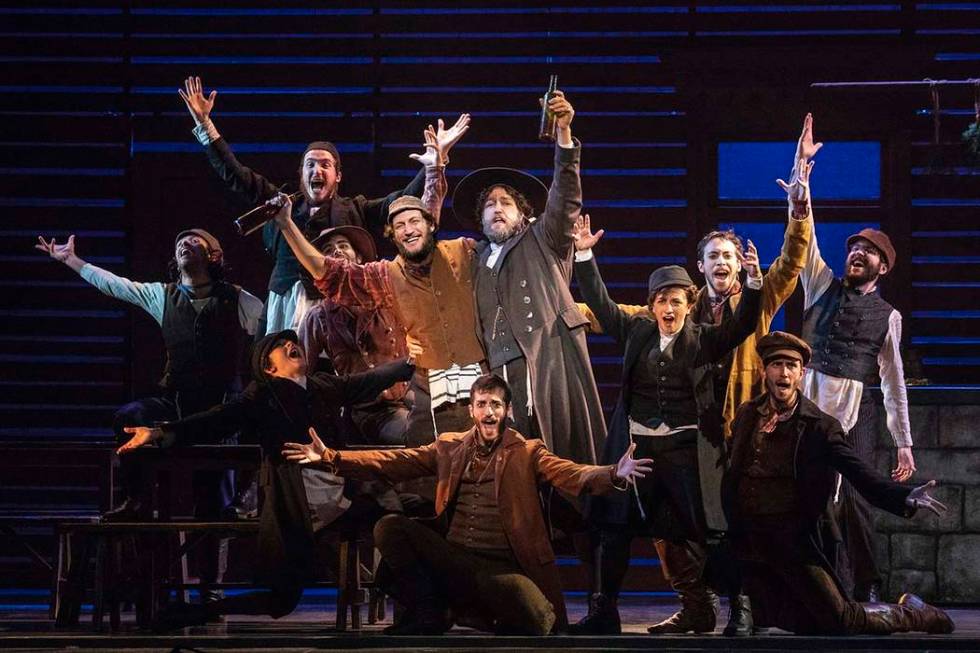‘Fiddler on the Roof’ coming to Las Vegas in early June

“Tradition, tradition, Tradition!”
The weight of the word’s intent insists it be called in triplicate, as though each echo makes a new demand — one for religious tradition, one for cultural and one for familial.
It was first called in 1905 by Tevye, the papa in Broadway’s “Fiddler on the Roof.”
And it’s still called upon today, by fathers everywhere, and notably by Israeli actor Yehezkel Lazarov, who portrays Tevye in the touring production of “Fiddler,” debuting at The Smith Center in June.
For Lazarov, the story of a Jewish father learning to navigate the constant tug-of-war between tradition and a changing world is a particularly poignant one.
For the 10 months that he is playing Tevye, a husband and father to young daughters, he is joined on the road by his own wife and young daughters.
“Professionally, the show has been amazing,” Lazarov says. “Personally, bringing my wife and daughters has been the most beautiful experience we had as a family.”
Tradition
The 1964 musical centers around Tevye and his five daughters in a small Jewish town in Russia in 1905. While Tevye yearns to maintain the stringent traditions of his faith and insulate his family from outside influences, his daughters fall in love, each with a man further from Tevye’s preferred customs.
When his two eldest daughters marry the men they love, rather than the men the town matchmaker arranged for them, Tevye is outraged but ultimately relents and blesses the unions.
His daughter, Chava, then falls in love with a boy who is not Jewish, which proves to be the tradition that Tevye cannot compromise. The scene ends with Chava collapsed on the ground wailing for Papa as he walks offstage.
In the final scene, the families in Anatevka are told they’re being expelled from the village and have three days to leave their home.
While the story focuses on a small group of people a very long time ago, Lazarov says the story remains powerful in modern culture because we all relate to its themes.
“The cloud of tradition is all over this play,” he says. “We all have traditions. We always say it’s relevant to people who need to leave their home or to anyone who had internal dialogue talking to God.”
Tevye journeys from a traditionally religious man to one who evolves through his daughters’ influence.
“It’s an allegory for humankind. We should all try to develop ourselves from where we come from, to where we are today and where we need to be,” he says. “Tradition is nice, but only as long as it’s not hurting anyone.”
As a younger man, Lazarov broke away from his own family’s tradition when he fell in love with a non-Jewish woman. Every night when he sees Chava crying on the ground, he sees himself through his own family’s eyes.
“This time,” Lazarov says, “I’m crying from being proud of having the power to fight against the old, dark traditional way of thinking.”
On tour
Lazarov initially feared the prospect of traveling with his family for so long, but he says that soon dissipated.
When the girls aren’t in home-school, the family visits each city’s art museum, then the science museum and, if there is one, the zoo. In the evening, the girls attend every premiere at a new venue.
“I can’t believe how great it is,” Lazarov says. “After a while, it’s like a long, long beautiful wave that brings you into a safe shore.”
He says the girls have been embraced by “Fiddler’s” theater family. And as the daughters of an actor/director father and a costume designer mother, it’s no surprise that Yali, Emma and Romi have set their sights on acting.
“So, we’ll have to deal with that later on,” Lazarov says wistfully. “It won’t take long until we have to release them to conquer everything in front of them.”
Beautiful moments
Though the Tony Award-winning musical touches on heavy ideas, Lazarov recalls laughing as he read the script, not having realized how funny the dialogue is.
“Above all else,” he says, “it has beautiful, amazing songs and incredible dance.”
Audiences are likely to recognize famous songs such as “If I Were a Rich Man” and “Sunrise, Sunset.”
A high point of the tour was when his parents came to his show in Los Angeles.
“Since I was 8, they would take me to shows and rehearsals. Then suddenly they saw me in Hollywood. It was a beautiful moment in my life.”
When the tour wraps later this year, Lazarov and his family plan to return to Israel and compile a photo book of their time in the U.S. and its many museums.
“I wake up in the morning and I pray, but I live with a non-Jewish wife,” Lazarov says. “And everyone who is in my life is accepting and loving, and this is how tradition should take place in my life.”
Contact Janna Karel at jkarel@reviewjournal.com. Follow @jannaniprogress on Twitter.